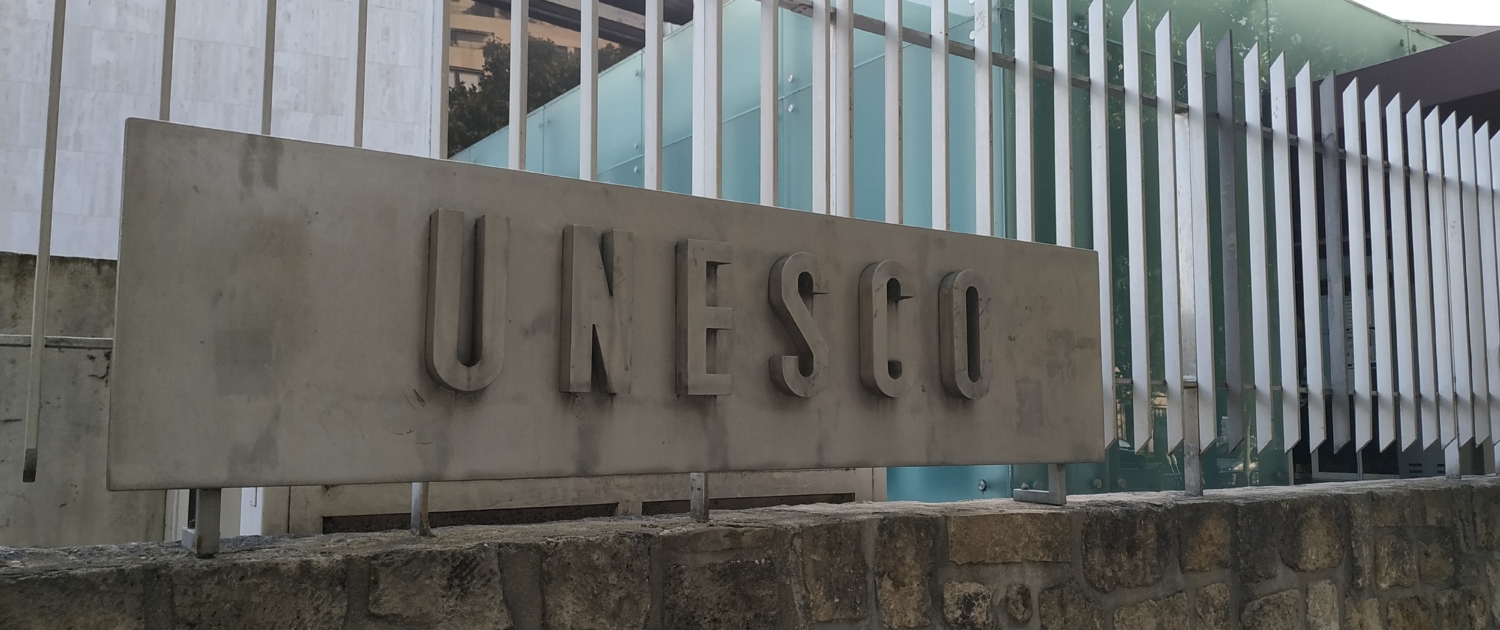The Ocean University Initiative team was present at the EurOCEAN 2019 conference which took place from 11 to 12 at UNESCO headquarters in Paris.
EurOCEAN conferences are major European marine science policy conferences providing a forum for policymakers and strategic planners at European and national level, to interact with the marine research community and marine and maritime stakeholders. EurOCEAN 2019 will discuss the contribution of European marine science to the United Nations Decade of Ocean Science for Sustainable Development (2021-2030).
About 200 people took part in these two days, which launched the NFV roadmap, “Navigating the Future V”, co-written by the scientists, member of the European Marine Board for European governments.
This well attended event was an opportunity to remind the audience of the outlines of the Ocean University Initiative. (Re)discover the speech of Denis Bailly, project coordinator, delivered during the second day of exchanges.
Ocean University Initiative has been launched by the University of Brest with the support of local authorities and many of our local and national science partners. Brest/Western part of Brittany hosts the largest concentration of marine research in France and France has put a large investment into concentrating research capacities in this area. As we have discussed yesterday and for many years now, there is an urgent need for more policy and science integration if we want to deliver what we call for, if we want to deliver sustainability in the area of ocean and coasts, but not only. We really need to rethink and reorganize science. One of the lines is science and policy; the other one is sustainability science as an integrated, inclusive field of science grounded in transdisciplinary, grounded in good disciplinary science, grounded in close integration/relationship to policy and industry. To build that, we really need to have our governments to invest in new instruments and mechanisms. This has to be designed at all scales, from the local to the global.
We think that the ocean is a major issue for international cooperation within the context of multilateralism. Whatever can be argued about the efficiency of the UN system, it is one of the major instruments we have today to deliver sustainability at the global scale through the international cooperation momentum it sets, particularly for the ocean. We need to get the science, the knowledge we develop, the work we do at the core of the UN system. Having the second largest EEZ and being a big player in ocean science, France has a responsibility in that endeavor. To strengthen science-policy linkage at global scale, the University of Brest is calling on the French government to invest in the creation of an institute of the UN University dedicated to the governance and science for the ocean and the coasts to support the achievement of SDG 14.
What is the UN University?
The UN University may not be known from all of you but it was created almost fifty years ago within the UN system as a UN agency, enjoying full academic independence within the UN system. The UNU is a network of thematic institutes. Surprisingly there has never been a country to offer the creation of an institute dedicated to ocean science. So, what the University of Brest as decided is to propose the creation of such an institute in France, in Brest, to create a mechanism for the global oceanographic community self-organize to voice at the highest level at the UN system in cooperation with other UN bodies. This should engage all sciences. I’m an economist and I come from social science. I voice the for integration of more social science involved in our area, more social science and transdisciplinary research, for more cooperation North, South, East, West, in all areas for all the basins of the global ocean. So what I am asking you today is to help us, to support our initiative, so that France decides to make this investment. Support us to get the decision very soon as a commitment by France to the UN Decade of Oceanographic Sciences.
 The European Marine Board provides a pan-European platform for its member organizations to develop common priorities, to advance marine research, and to bridge the gap between science and policy in order to meet future marine science challenges and opportunities.
The European Marine Board provides a pan-European platform for its member organizations to develop common priorities, to advance marine research, and to bridge the gap between science and policy in order to meet future marine science challenges and opportunities.
The European Marine Board was established in 1995 to facilitate enhanced cooperation between European marine science organizations towards the development of a common vision on the strategic research priorities for marine science
in Europe. Members are either major national marine or oceanographic institutes, research funding agencies, or national consortia of universities with a strong marine research focus. In 2019, the European Marine Board represents 33 Member Organizations from 18 countries.
The Board provides the essential components for transferring knowledge for leadership in marine research in Europe.
Adopting a strategic role, the European Marine Board serves its member organizations by providing a forum within which
marine research policy advice to national agencies and to the European Commission is developed, with the objective of
promoting the establishment of the European Research Area.
See this page in: Français












